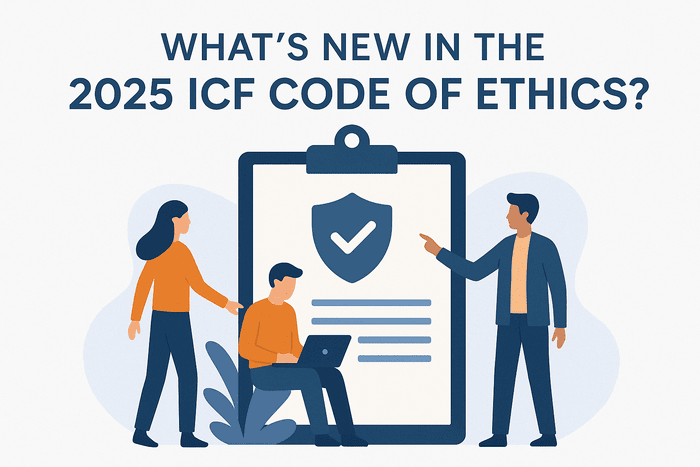
Effective strategic planning and stakeholder management are essential skills for leaders in a rapidly changing business environment. Strategic planning provides...
Ever feel like the ground beneath the coaching world is shifting? Technology is advancing, global boundaries are blurring, and the expectations of clients are becoming more sophisticated than ever. As coaches, our commitment to ethical practice must evolve alongside this dynamic landscape. That’s why the 2025 ICF Code of Ethics isn’t just a new document; it’s a vital upgrade to our professional compass.
For coaches at every level, from students just beginning their journey to seasoned professionals, the International Coaching Federation (ICF) Code of Ethics is the bedrock of our profession. It’s the promise we make to our clients, our colleagues, and ourselves that we will operate with the highest levels of integrity. So, what’s changed in this latest version, and why do these updates matter so much for your coaching practice? Let’s dive deep into the key revisions and understand how they elevate our craft, ensuring we’re not just avoiding harm, but actively “doing good”.

The most significant change in the 2025 ICF Code of Ethics is its expanded scope. The previous version primarily focused on credentialed coaches and members. The 2025 code now explicitly applies to the entire ICF ecosystem. This is a powerful statement of a unified commitment to ethical conduct. This expanded scope means that everyone, from ICF staff and volunteers to coach educators and even students in training, is now held to the same high ethical standards.
This is more than a policy shift; it’s a cultural one. It ensures that the ethical principles of professionalism, respect, and integrity permeate every interaction within the ICF community. This consistency builds trust and credibility not only within the profession but also with the public. When a client engages with any part of the ICF, they can be confident they are interacting with an organization and individuals committed to a singular ethical vision. For coaches, this means that the responsibility to uphold the ICF Code of Ethics is a shared one, strengthening the foundation of our entire profession. This a key element that every ICF professional needs to understand.
The world of coaching has been revolutionized by technology. We use everything from online scheduling platforms and transcription services to AI-powered coaching tools. The 2025 ICF Code of Ethics acknowledges this evolution with a groundbreaking new standard dedicated to the responsible use of artificial intelligence and technology. This new standard, a critical part of the ICF Code of Ethics framework, mandates that coaches must be transparent about the use of any technology that handles client data.
Think about it: are your Zoom sessions being transcribed? Are you using an AI tool to analyze session notes? The new ethical standard requires you to disclose these practices to your client and ensure their data is handled with the utmost care, confidentiality, and security. This is a crucial step in a world where data privacy is paramount. It shifts the burden of awareness from the client to the coach, reinforcing our role as a trusted partner and data steward. For any Erickson professional coach, this means proactively updating your coaching agreements and communication to reflect these new responsibilities. The ICF Code of Ethics now provides a clear roadmap for navigating these complex digital waters, ensuring that technology enhances the coaching experience without compromising trust.
In today’s professional world, many of us wear multiple hats. A coach might also be a consultant, a mentor, or a corporate trainer. While this versatility is often an asset, it can also create blurred lines and potential conflicts of interest. The 2025 ICF Code of Ethics addresses this head-on with a new standard that provides explicit guidance on managing multiple roles.
This new standard requires coaches to be completely transparent with their clients about any and all roles they may hold. The core principle is simple: be clear about when you are coaching and when you are not. If you are also providing consulting services to the same client, you must disclose this and obtain their consent. This isn’t about forbidding multiple roles; it’s about managing them with integrity and clarity. The goal is to protect the coaching relationship, which thrives on a unique form of partnership where the client’s agenda is always the priority. By setting these clear boundaries, the ICF Code of Ethics helps coaches maintain the integrity of their practice and ensures that the client never feels confused or conflicted about the nature of the relationship. This is an essential skill for any professional coach, especially those working in large organizations or with long-term clients.
The structural changes in the 2025 code are just as important as the new standards. The code has been reorganized for clarity and accessibility, with standards grouped into five distinct sections:
Agreements for Client and/or Sponsor Engagement
Confidentiality and Legal Compliance
Professional Conduct and Conflicts of Interest
Commitment to Delivering Consistent Value
Professional Integrity and Accountability
This new structure makes it easier for coaches to find the specific guidance they need when facing an ethical dilemma. But perhaps the most profound structural change is the full inclusion of the ICF Core Values and Ethical Principles within the body of the document itself. The 2020 code referenced these values, but the new code integrates them completely, making them the foundational pillars of every standard.
These values—Professionalism, Collaboration, Humanity, and Equity—are no longer just a separate statement; they are the heart and soul of the 2025 ICF Code of Ethics. They serve as the moral compass for ethical decision-making. This move encourages coaches to view the code not as a rigid set of rules, but as a living framework guided by our deepest values. This focus on values-based decision-making is a hallmark of a mature and evolving profession.
The 2025 ICF Code of Ethics concludes with a refreshed Pledge of Ethics. This isn’t just a formality; it’s a powerful and personal commitment that every ICF professional makes. The pledge is a promise to act with integrity, to continuously reflect on our ethical growth, and to seek assistance when faced with complex ethical situations. It’s an affirmation of our dedication to a higher standard of conduct.
This renewed pledge emphasizes a proactive approach to ethics. It encourages coaches to cultivate ethical maturity through continuous self-reflection and increased self-awareness. It’s about being courageous enough to address ethical concerns, whether they involve our own conduct or that of our colleagues. This emphasis on a proactive, values-driven ethical practice is a defining feature of the 2025 ICF Code of Ethics and a core tenet of the Erickson coaching philosophy.
For Erickson Coaching International, a leader in coaching education and a proud partner of the ICF, these updates are not just important—they are a validation of our core principles. Our commitment to solution-focused, outcome-oriented coaching has always been rooted in a deep respect for the client and a belief in their potential. The 2025 ICF Code of Ethics aligns perfectly with this philosophy.
The new code’s emphasis on transparency, responsible use of technology, and the prioritization of client well-being are all cornerstones of the Erickson methodology. Our students and graduates are already trained to embody these principles, making the transition to the new code a seamless and natural one. This updated code provides us with a stronger framework to continue delivering world-class coaching education and to produce professional coaches who are not only skilled but also ethically impeccable.
In an increasingly complex world, the need for skilled and ethical coaches is more critical than ever. The 2025 ICF Code of Ethics provides the clarity and guidance needed to meet this demand. It’s a tool for growth, a safeguard for our clients, and a powerful testament to the maturity of the coaching profession. By embracing these changes, we’re not just keeping up; we’re leading the way.

Effective strategic planning and stakeholder management are essential skills for leaders in a rapidly changing business environment. Strategic planning provides...

Change Management & Digital Transformation: Build Adaptive Leaders with Erickson Coaching Rapid technological advances, shifting customer expectations and global disruption...

Discover how Erickson’s solution‑focused coaching delivers up to 788 % ROI and drives operational excellence by improving strategic thinking, communication and...

The coaching profession has moved from the margins to the mainstream. Recent global studies show that the number of professional...

India’s economy has transformed dramatically over the last decade, and the demand for top business coach India services has grown...

When searching for a certified life coach program price, it’s natural to start by comparing tuition fees. Aspiring coaches want...

Neuro-Linguistic Programming (NLP) is experiencing a resurgence in India. Social media, workshops and high-energy seminars promise instant breakthroughs by rewiring...

Many professionals pursue the title of Certified Organizational Development Coach with the expectation that a credential alone will open corporate...

Some providers offer to fast-track you to PCC status through purely online modules for a fraction of the cost of...